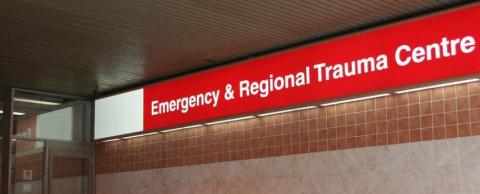I couldn’t feel the right side of my body, but I didn’t call 911. I called a friend. Don’t ask me why. Maybe because I was terrified I was going to die, and, sitting in my car with no one around, I didn’t want to die alone. My friend rushed to get to me and, at my insistence, drove me to my doctor’s office. She wanted to go straight to the emergency room because we were only a few minutes away, but I had to see my doctor. I needed to hear her say I was going to be okay, that this wasn’t a stroke.
My doctor did her best to reassure me, but she also told me to go to the emergency room, and my hope evaporated. If I was okay, why did I still have to go to the hospital? I don’t know exactly how long it took to get there. Everything moved in slow motion. I remember trying to move my fingers and panicking when they still wouldn’t respond to my command, I just knew something was terribly wrong, something that was going to change my life forever.
Then I was inside the ER, surrounded by more doctors than I’d ever seen in one room before, and they were all asking me questions, their words overlapping one another.
How are you feeling?
Can you squeeze my hand?
Can you follow my finger?
The feeling had started to return to my arm and leg. That should have made me breathe a sigh of relief. But I just began to shake all over. I was given an aspirin and some water. Then the nurses came in. A needle pierced my vein. An IV cord attached to a bag of saline. It could have been something else, though. I don’t know what they gave me, but it wasn’t anything to calm me because my stomach was coiled like a slinky. And even more questions came.
Are you able to smile?
Can you raise your arms?
How are you feeling now?
This couldn’t be happening. I was much too young to be having a stroke. No, I wasn’t exactly active, but I’d had a car accident several years before that had permanently damaged my spine. Exercising caused excruciating pain. Okay, yes, I did eat fried foods and junk food and any other kind of food that wasn’t good for me, but that couldn’t cause this, right? I started to ask my own questions even though I already knew the answers. If this was a stroke, how much of it had I caused?
Vials of my blood were taken before I was wheeled down the hallway for a CT scan. The doctors were almost sure I’d had a transient ischemic attack—a “mini stroke,” but they needed more information. Then came the carotid scan and a host of other tests I can’t even remember. I was admitted to the hospital while my friend notified my other friends. My phone rang incessantly as loved ones sought updates, answers I couldn’t give them.
As I laid there in the hospital bed, my teeth chattered even though I wasn’t cold. Anxiety gripped every nerve in my body as I played the word “stroke” over and over again in my mind. My mother had a stroke when she was in her forties. Not a mini one. A full stroke. She recovered, but it had been a long road. That should have been a warning for me, but I’d battled other health issues and hadn’t considered that I might be caught unawares by this beast. And honestly, I hadn’t thought about my mom’s stroke in a very long time, probably because it hadn’t happened to me.
At almost eleven o’clock at night, a kind doctor in a white coat confirmed that I had suffered a mini stroke. He went on to explain exactly what it was and told me I would need to follow-up with my doctor for further treatment. At least that’s what I think he said. I don’t remember much after hearing his confirmation. I know I didn’t think I’d ever stop shaking.
There was nothing mini about this stroke, in my mind. No, it wouldn’t leave me paralyzed or incapacitated in any way, but it would have a major impact on my life. Long into the night, I stared at the ceiling, wondering how things were going to change. How they had to change. Because this might be the only warning I’d ever get. I looked up more details on my phone that only amplified the panic inside of me. (I don’t recommend using a search engine when you’re looking for medical answers.)
Even though I can talk about what happened now, there’s no real way to describe the terror of that day. Though it seemed to pass in slow motion, in reality, everything happened fast and all at once. Through a jumble of commands and questions, I began to realize I’d dodged a bullet. I’d survived this mini stroke, but most people do. The important questions now were: could a bigger one be avoided, and how much time did I have before I would be faced with what my mother had endured?
That life-changing event proved to be an impetus and an impediment to me. While I never miss the aspirin and cholesterol medication I’m supposed to take daily, I’m almost always on edge, wondering if the tingling in my right hand is a signal that another stroke is right around the corner.
I’ve done almost everything I can to make sure that doesn’t happen, but there are no guarantees. Still, as more time passes, I grow a little more encouraged. Perhaps I won’t be one of the close to one million people this year that will have a stroke. There is still more I can do to prevent my future from changing drastically, and I’m working on it. In the meantime, the threat hangs over my head, and every day, I wonder.




